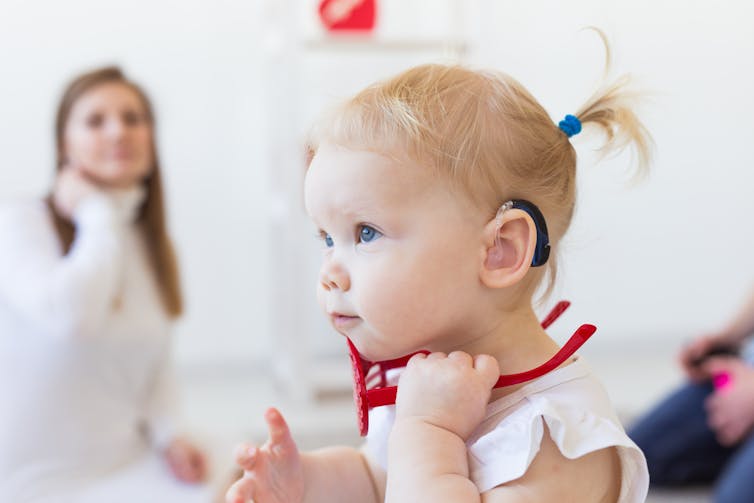Caring for someone with disability is a complex and demanding task. The latest Australian Bureau of Statistics figures show this role is increasingly being undertaken by people who have disability themselves. There were 1.2 million primary carers in Australia in 2022, and of these, 43.8% have disability (up from 32.1% in 2018).
Disability support and aged care are critical issues for the federal government right now. The new Aged Care Act will take effect in July next year and amendments to the National Disability Insurance Scheme (NDIS) Act roll out from early October.
A National Carers Strategy, recognising the demands placed on informal carers and the need for better supports, is also being developed.
What do this group of carers need? And are they getting the right kind of support?
Invisible labour
Three million Australians currently provide informal care for loved ones with disability, medical conditions, mental illness or frailty from ageing.
In line with our ageing population, one in six carers are over 65 and most older Australians want to age “in place” at home. This means informal care needs are set to rise exponentially.
Improved diagnosis, more disclosure of disability status and higher prevalence of health conditions leading to disability are increasing the numbers of and demands on informal carers.
Who is doing the caring and why?
While both women (12.8% of the population) and men (11.1%) provide informal care, women are more likely to be primary carers (6.1% are women, 3% are men.
Primary carers are less likely to be in paid employment than non-carers (64.6% to 82%), and fewer than half of those caring for 40 hours or more a week are employed. Informal carers are more likely to have a disability or chronic health condition (38.6%) than the general population (21.4%), with even higher rates among primary carers (43.8%).
The main reasons for becoming a carer are a sense of family responsibility and emotional obligation. Over a third of those caring for their child say they have no other choice.
We analysed qualitative data from the 2022 National Carer Survey conducted by Carers NSW.
Of 6,825 respondents from across Australia, over 80% were women and almost half (47.6%) identified as having disability or long-term health conditions, which the survey combines. Disability and poor health among carers are associated with higher levels of emotional distress and greater difficulty in accessing services.

Desizned/Shutterstock
‘My prospect of earning an income and saving is bleak’
Statistics tell us only part of the story. The voices of informal carers who report living with disability or chronic health conditions shed light on the layered demands they face. They reported that care is often invisible, undervalued and ceaseless. One woman, aged 73, described informal care as “hard and unappreciated work”.
A lack of government support and financial uncertainty left many despairing. As one carer, aged 56, said:
No government recognises us and in the end we are saving them billions/trillions of dollars […] I have been a carer for over 13 years and it will go on for many years, so my prospect of earning an income and saving is bleak.
Caring can have profound health and wellbeing effects. As another woman, aged 56, said:
Being close to retirement myself, and having elderly parents, puts so much strain on my own health, mentally and physically. I have had to deal with breast cancer and its treatments and ongoing side effects. This is really stressful. I oversee all the services, and manage ongoing issues. My care role is endless. I only work minimal hours myself due to my care role. Who looks after me?
Caring for carers
Carers with disability or chronic health conditions report a lack of appropriate, accessible and timely services. This makes it hard to meet their own health-care needs. Many struggle with arranging support across mainstream and NDIS providers on behalf of the person they care for and themselves.
Our research about the needs of a specific group of disabled Australians with care-giving responsibilities – parents with intellectual disability – find they can fall between system gaps when mainstream services are not accessible or the NDIS fails to take a family-centred approach.
A parent with intellectual disability may struggle to understand complex and shifting eligibility rules and might be able to use their NDIS funding to assist with meal preparation for themselves but not for their child. As one mother with intellectual disability said:
No one explained to me, ‘Oh, the NDIS package can help you with a lot of different things’, like helping with my parenting capacity.
Changes and opportunity
A cornerstone of the NDIS reforms is the creation of foundational supports. That’s good news for the 86% of disabled Australians without an NDIS plan and their informal carers, who rely on mainstream services like schools, health services and public transport.
Likewise, the National Carers Strategy is an opportunity to ease some of the burden shouldered by many informal carers. By consulting with carers directly, services designed to meet their diverse needs and circumstances can be made available. In the immediate term, often carers reach crisis point before receiving support. Early interventions in the form of practical, everyday, orientated supports – including respite together with peer support – can help.
Proper support for carer wellbeing and economic and social participation, from all levels of government, recognises the complex role carers play and their own support and health-care needs. These are only going to increase in the future.
The authors wish to acknowledge the contribution of Sarah Judd-Lam and Lukas Hofstaetter from Carers NSW for their data and analysis contributions to this piece.
Susan Collings, Senior Research Fellow, Transforming early Education and Child Health Research Centre, Western Sydney University; Elisabeth Duursma, Research Theme Fellow Education and Work, Western Sydney University; Gabrielle Weidemann, Associate Professor in Psychological Science, Western Sydney University, and Michelle O’Shea, Senior Lecturer, School of Business, Western Sydney University
This article is republished from The Conversation under a Creative Commons license. Read the original article.









